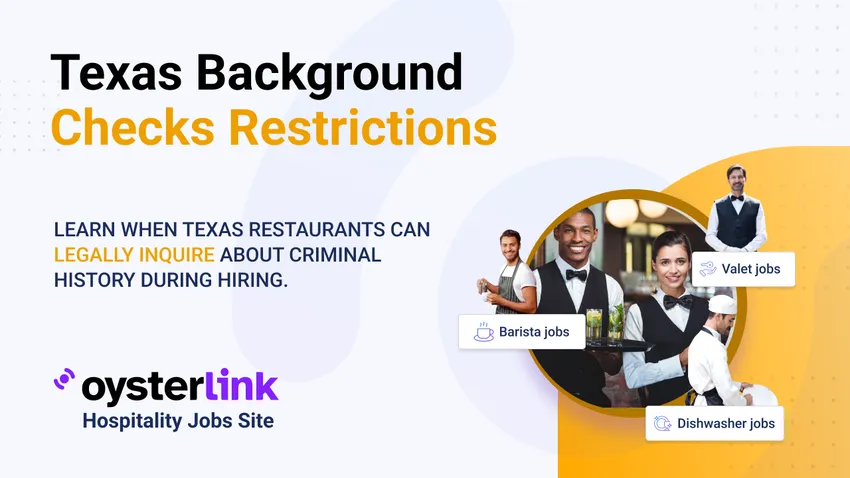Texas Background Check Restrictions: When Can Restaurants Ask About Criminal History - Key Takeaways
- Before September 1, 2025, Texas employers can ask about criminal history at any hiring stage due to no statewide restrictions.
- Starting September 1, 2025, House Bill 2466 limits employers with 15+ employees from asking about criminal records on initial applications.
- Employers may inquire about criminal history only after determining an applicant is "otherwise qualified" and has a conditional offer or interview invitation.
Texas restaurants face new rules on criminal history inquiries under HB 2466, effective September 2025. Understanding these background check restrictions helps ensure fair hiring practices and compliance.
Employers must update policies to reflect when and how they can ask about criminal records during hiring.
1. Current Background Check Restrictions for Texas Restaurants
As of now, there is no statewide "Ban the Box" law in Texas. This means employers, including restaurants, can ask about an applicant’s criminal history at any time during the hiring process.
Previously, some cities like Austin had local ordinances restricting such inquiries. However, the Texas Regulatory Consistency Act (TCRA) passed in 2023 preempts all local hiring laws, making these ordinances unenforceable.
This results in a uniform state policy where restaurants currently have no legal restrictions on when they can request criminal history information from applicants.
If you're refining role criteria, see the restaurant manager job description.
2. Important Changes Coming September 1, 2025 Under HB 2466
Effective September 1, 2025, Texas will implement House Bill 2466, which introduces statewide "Ban the Box" provisions.
Under HB 2466, employers with 15 or more employees—including restaurants—will not be able to ask about criminal history on initial job applications.
Ensure job posting compliance as you update applications and workflows.
Employers may only inquire about an applicant’s criminal history after:
- Determining the applicant is "otherwise qualified."
- Extending a conditional offer of employment or inviting the applicant for an interview.
This new law aims to give applicants a fairer chance by preventing discrimination based solely on criminal records early in the hiring process.
Scope and Exceptions of the New Law
HB 2466 applies to both public employers and private employers with at least 15 employees, which includes many medium to large restaurant operations.
However, some positions are exempt, especially where background checks are legally required, such as law enforcement, healthcare, childcare, and financial roles.
Additionally, independent contractors, gig workers, and freelancers are not covered by this law.
Understanding "Otherwise Qualified" in Hiring Context
The law does not clearly define what constitutes being "otherwise qualified."
This likely means that employers should evaluate applicants based on education, experience, and skills first, then pursue criminal history checks as a secondary step.
This two-step process separates consideration of qualifications from criminal background, promoting fairer hiring decisions.
3. Recommendations for Texas Restaurants to Comply with Background Check Restrictions
Restaurants should begin updating their hiring processes well before the September 2025 enforcement date to ensure compliance with HB 2466.
Use this restaurant staff hiring guide to plan compliant screening stages.
- Revise job applications to remove questions about criminal history from the initial application stage for positions where the law applies.
- Train hiring managers on the new process—evaluate qualifications before criminal background inquiries.
- Develop a two-stage background check procedure that first assesses skills and experience, then reviews criminal history if a conditional offer is extended.
Additionally, although HB 2466 does not mandate it, the Equal Employment Opportunity Commission (EEOC) recommends conducting individualized assessments of an applicant’s criminal record.
This means considering factors such as:
- The nature and severity of the offense.
- Time elapsed since the offense.
- Relevance of the criminal history to the job duties.
Define duties clearly with the server job description.
For bar positions, reference the bartender job description.
Kitchen teams can align with the cook job description.
4. Staying Informed and Preparing for Future Changes
Texas employers should monitor updates and legal interpretations of HB 2466 as it takes effect.
The law's new definitions and application nuances may evolve through agency guidance or court rulings.
Remaining informed through official channels will help restaurants adjust policies promptly and avoid legal issues.
5. Additional Resources for Texas Employers on Background Check Laws
- Texas Workforce Commission: https://www.twc.texas.gov/
- Texas Legislature Online: https://capitol.texas.gov/
- Equal Employment Opportunity Commission (EEOC): https://www.eeoc.gov/
Texas Background Check Restrictions: Conclusion
Beginning September 1, 2025, Texas restaurants with 15 or more employees must comply with HB 2466, restricting when they can ask about criminal history during hiring.
By delaying criminal history inquiries until after assessing qualifications and extending conditional offers, restaurants can foster fair hiring and reduce bias.
Proactively updating hiring practices and following recommended individualized assessments will ensure compliance and promote equitable employment opportunities in Texas’s changing legal landscape.









Loading comments...